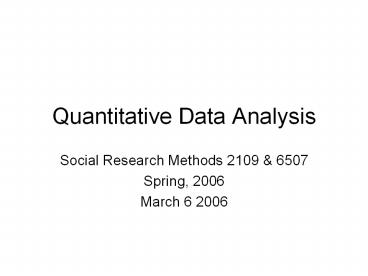Quantitative Data Analysis - PowerPoint PPT Presentation
Title:
Quantitative Data Analysis
Description:
Quantitative Data Analysis Social Research Methods 2109 & 6507 Spring, 2006 March 6 2006 Quantitative Analysis: convert data to a numerical form and statistical ... – PowerPoint PPT presentation
Number of Views:401
Avg rating:3.0/5.0
Title: Quantitative Data Analysis
1
Quantitative Data Analysis
- Social Research Methods 2109 6507
- Spring, 2006
- March 6 2006
2
Quantitative Analysis convert data to a
numerical form and statistical analyses
- quantification (??) the process of converting
data to a numerical format (??????????)
3
Quantification of Data
- Develop codes and a codebook
- Coding data (????)
- Data entry (????)
- Data file construction (??????)
- Statistical Analyses
4
Quantitative Data Analyses
- Univariate analyses (?????) a single variable
- Distributions, central tendency, dispersion,
subgroup comparisons - Bivariate analyses (?????) the analysis of two
variables - Multivariate analyses (?????) analyzing more
than two variables simultaneously
5
Univariate Analysis
- Distributions (??)
- Frequency distribution (can use a graph)
- Central tendency (the form of an average) (????)
- The arithmetic mean (?????)
- The mode (the most frequently occurring
attribute) (??) - The median (the middle attribute in the ranked
distribution of observed attributes) (???)
6
Univariate Analysis
- Dispersion (??) the way values are distributed
around some central value (ex an average) - The simplest measure the range
- Standard deviation an index of the amount of
variability
7
Examples of Dispersion
8
Please note some calculations are not suitable
to all variables
- Continuous variables (quantitative variables)
(????) a variable whose attributes form a steady
progression - Ex age
- Discrete variables (qualitative variables)
(????) a variable whose attributes are separate
from one another, or discontinuous - Ex gender
- Nominal or ordinal variables
9
Bivariate Analysis
- Explanatory bivariate analyses consider causal
relationships (???????????) - Explanatory or Independent Variables vs.
Response or Dependent Variables
10
Measures of association
- The basic idea proportionate reduction of error
(PRE) (???????) - If you know the relationship between the two
variables, you will make fewer errors in guessing
values of one variable if you know values of the
other. - Today focus on correlation (????)
11
A Scatterplot (???) display the relationship
between two quantitative variables measured on
the same individuals (???????????)
12
Looking at a scatterplot
- Look for direction, form, and strength of the
relationship - Direction (??)
- Positive association (???)
- Negative association (???)
13
Looking at a scatterplot
- Form (??) what shape or pattern?
- ??? ??? ??? ???
- Strength the points in the scatterplot lie to a
simple form (a line or a curve?) (??????????????)
14
(No Transcript)
15
(No Transcript)
16
Outlier (???) an individual obs. falling outside
the overall pattern of the graph
17
The correlation coefficient (r)
- Correlation (r) a measure of the strength and
direction of the linear relationship between two
quantitative variables (???????????????) - r can take on values from -1 to 1
18
Facts about correlation
- A positive value of r a positive association
- A negative value of r a negative association
- r closer to 1 or -1 stronger association
- r 0 no association
- r measures the strength of linear association
- r (y, x) r (x, y)
- r sensitive to outliers
19
Examples of correlations
20
More about correlations
- How big is a correlation?
- No hard and fast rule
- In general abs(r) gt0.7--- strong association
- But in social sciences, r is usually not strong
in terms of its value (lt 0.7)
21
Formula of the correlation coefficient
22
To get r in SPSS
- ??(A) ???(C) ????
23
Conclusions about correlation
- Scatterplots the first step when considering the
association between two quantitative variables - r summarize the strength of linear association
- Distinct (but related) to the slope of the
regression line































